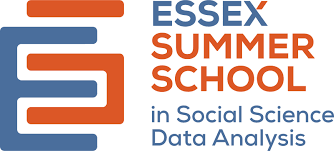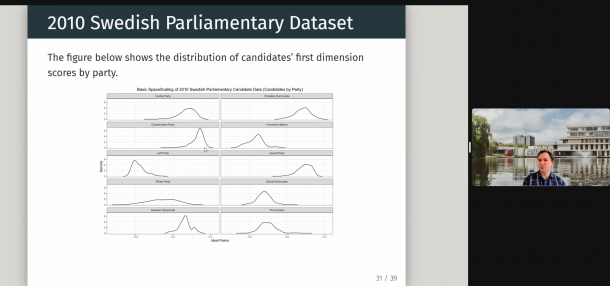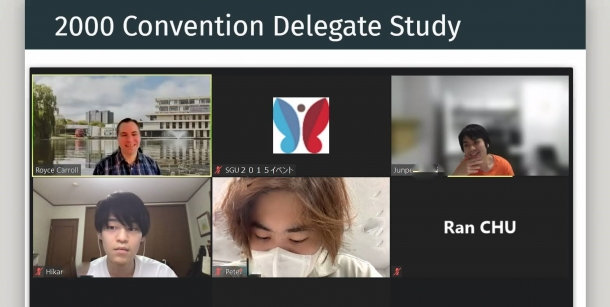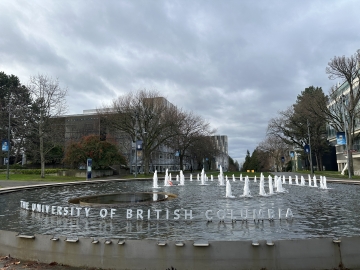Due to the COVID-19 pandemic which affected people’s lives largely, the Essex Summer School at Waseda University (ESS@WASEDA), which was held every summer at Waseda Campus, could not be held in the academic years 2020 or 2021. Instead, the Center for Positive/Empirical Analysis of Political Economy encouraged Waseda graduate students to participate in the ESS course offered online by subsiding the course fee in those years. Now, ESS@WASEDA returned this September for its fifth installment, the first in-person implementation in three years.
- Course 1: Scaling Methods and Ideal Point Estimation
by Dr. Royce Carroll (online) - Course 2: Introduction to Programming for Big Data and Machine Learning in Social Science
by Dr. Matsuo Akitaka (in person, Waseda Campus, Building 3)
Period: September 10 – September 22, 2022
For further information: About the course
Course 1: Scaling Methods and Ideal Point Estimation
Royce Carroll is a Professor in Comparative Politics at the University of Essex. His research focuses on representation and legislative politics, as well as methods to analyse survey and voting data, attitudes, preferences and ideology.
This course focuses on methods to discover, understand and visualize latent patterns in data and is especially suited to students with projects using survey data and other forms of relational data used in political science, sociology, economics, business, marketing, and psychology.
Dr. Carroll’s comments on the course:
The students at the Waseda-Essex Summer School were highly engaged in the course and it was a rewarding experience to teach them. By the conclusion of the course, it was clear that the students were ready to apply the skills they learned to their research. I encouraged them to look for potential applications in their data and stay in touch with me for advice on how to use the methods. Overall, it was a very enjoyable experience to meet these students and I look forward to future cooperation with Waseda.
Students’ comments:
Student 1 (Graduate school of Political Science, M2):
This Essex Summer School research course titled “Scaling Methods and Ideal Point Estimation” over a duration of about two weeks introduces us to various spatial models and scaling methods to discover, understand and visualize latent patterns in behavioral and relational data in political science and sociology. The instructor Dr. Royce Carrol uses real-world survey, legislative, and judicial data as examples to teach us how to derive measures of ideology and spatial preference and how to generate dimensional structures and properties.
Through a combination of theoretical discussions and hands-on lab workshops in R based on the textbook “Analyzing Spatial Models of Choice and Judgment (Armstrong et al., 2020)” and a series of cutting-edge methodology-focused journal articles, we were able to get familiar with the relationships between Item Response Theory, Ideal Point Estimation, and multidimensional scaling methods as well as their potentials and limitations. I am again reminded of the value of representing, describing, and analyzing politics in terms of points and distances by imagining an abstract and configurational space in political psychology (psychometrics and polimetrics) as well as the power of combining formal models with empirical evidence in the social sciences.
Since the measurement theories and scaling techniques mentioned throughout this course seem to form the basis of many recent studies in the social sciences that deal with topics such as surveys, voting, attitudes, preferences, and ideology, this course not only offers me opportunities to practice my programming skills but also broadens my perspectives about the state-of-the-art of the social sciences. Moreover, it brings insights to my ongoing research that intends to compare public opinion and civic culture in East Asian societies with the help of transnational survey databases such as the World Values Survey and helps me reflect upon and derive implications from the methodological and empirical parts of my master’s thesis.
I strongly recommend this course to graduate students at the GSPS in the areas of contemporary and comparative politics whose theses are trying to use attitudinal and electoral data and are hoping to apply geometric models, machine learning, and text-as-data or those who simply want to get to know some cutting-edge methodologies in polimetrics.
Student 2 (Graduate School of Political Science, 3rd year PhD):
This course has great content about statistic and data science. It also teaches the students about useful R code. The examples on the lecture are from actual project, so it is a great opportunity to learn about the real application.
Course 2: Introduction to Programming for Big Data and Machine Learning in Social Science
Akitaka Matsuo is a postdoctoral fellow in the Institute for Analytics and Data Science at the University of Essex. His research interests lie in data science and politics, in particular in the statistical methodology for scaling survey responses and legislative behavior and natural language processing of political texts (e.g. social media texts, open-ended survey answers, and parliamentary speeches).
The course is intended to provide social scientists with knowledge of how to carry out data science projects with the statistical language R.
Dr. Matsuo’s comments:
The goal of the course was to learn how to use the statistical language R for various aspects of data science, such as acquiring and maintaining large data sets, and how to use machine learning techniques to gain insight from the data. Key topics included are how to use the tidyverse to access and process various data formats, how to retrieve data from the Internet, and the fundamentals of machine learning and its practice using R. We started this course by learning how to use R on cloud servers, considering that cloud computing environments are becoming more and more important for data science.
Although the course had a relatively small number of participants, they were all enthusiastic and their high motivation was evident in their performance on the exam given on the last day of the course. It was also an interesting experience for me to talk with the students during office hours about how they would apply the course content to their research.
As I mentioned in class, I designed this course as the first step for social science students to use R to do data science. I hope that what you learn here will provide you with clues to apply to the data analysis in their future research. Furthermore, I would be happy if this experience would encourage you to consider studying abroad to learn more about your field of expertise or the ever-advancing methods of data analysis in the social sciences.
Students’ comments:
Student 1 (School of Political Science and Economics, 3rd Year):
This course has great content about statistic and data science. It also teaches the students about useful R code. The examples used during the lecture are from actual projecta, so it is a great opportunity to learn about the real application. The content of machine learning and web scraping is a useful tool when handling the data. I see this as a good starting point to dig into the computer science and apply it to my own research.
Student 2 (Graduate school of Political Science, M1):
It was a very educating introduction course, and the teacher is very nice. I also felt the pace was quite fast, and some of the coding was difficult for me to understand. I think I can utilize the machine learning and web scrapping techniques in my research. For example, I am curious about what makes people support their autocratic regimes, so I can gather data from online to analyze netizens’ comments and posts, etc.
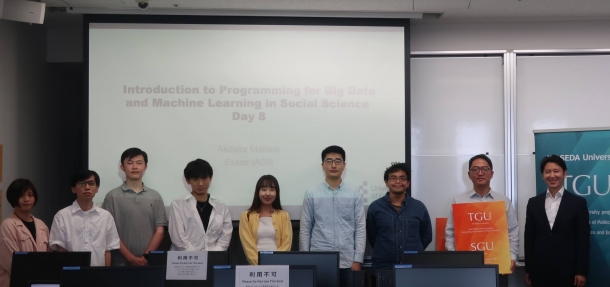
The class ended successfully with a class photo session with Dr. Matsuo and Professor Hino, a coordinator at Waseda University.
After the two-week session, Dr. Carroll and Dr. Matsuo, from the University of Essex, and Professor Hino and Professor Tago, from the Faculty of Political Science and Economics, talked frankly about the further possibility of educational collaboration.
Future Collaborations with the University of Essex
Dr. Airo Hino, Professor, Faculty of Political Science and Economics
A meeting was held after the Summer School to discuss future collaborations on method trainings to graduate students between the University of Essex and Waseda University.
We were fortunate to be able to hold the Essex Summer School @ Waseda this year for the first time since the outbreak of Covid-19. There were still some travel restrictions and the participants were those who already resided in Japan, but cutting-edge analytic methods could be learned in both face-to-face and online environments.
Let me take this opportunity to thank faculty members and staff of the Faculty of Political Science and Economics, as well as the Waseda Institute of Political Economy for providing enduring support to the project. Essex Summer School has one of the longest traditions in running a summer school in data analysis in social sciences since 1967, and this year, which marks the 56th year of the program, saw more than 500 participants from over 50 countries. Essex Summer School @ Waseda, which started in 2016, is designed to provide opportunities to graduate students in Asia without having to go to the UK to partake in the method training courses. Waseda has offered the Essex Summer School @ Waseda for 5 years, starting in 2016, of which the Center for Positive/Empirical Analysis of Political Economy has played a crucial role.
Once this year’s summer school came to a close, discussions were held to think about the future of the program. The University of Essex currently offers close to 50 varied courses on analytical methods, and I feel there is great significance for deepening ties between methodological training and analytical methods, which are developing rapidly in the field of social sciences, while keeping in mind the diverse world we live in. We hope that participants take the data analysis skills they’ve learned with them to continue to grow these skills as they use them in their research areas.
Though the program was unfortunately postponed for two years due to Covid-19, we now look forward to next year, the 6th occurrence of Essex Summer School @ Waseda, which we hope will lead to further developments in the field of methodological training.
